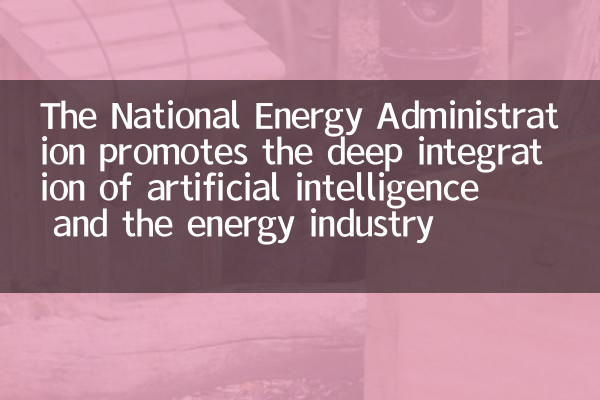The National Energy Administration promotes the deep integration of artificial intelligence and the energy industry
In recent years, the rapid development of artificial intelligence (AI) technology has brought revolutionary changes to all walks of life. As an important pillar of the national economy, the energy industry is also actively exploring the application scenarios of AI technology. Recently, the National Energy Administration issued the "Guiding Opinions on Promoting the Deep Integration of Artificial Intelligence and the Energy Industry", which clearly stipulates that AI technology is the core driving force for the digital transformation of the energy industry, aiming to improve energy production efficiency, optimize resource allocation and promote green and low-carbon development.
1. Policy background and goals

The National Energy Administration pointed out in the document that by 2025, AI technology will be applied on a large scale in energy production, transmission, storage and consumption, forming a number of replicable and popularizable typical cases. Specific goals include:
| field | Target |
|---|---|
| Energy production | AI technology covers more than 30% of thermal power, wind power and photovoltaic power stations |
| Grid dispatch | Achieve more than 80% of provincial power grid AI-assisted decisions |
| Energy storage management | Build more than 10 AI-driven energy storage demonstration projects |
| Energy consumption | Promote smart electricity use equipment, covering 50 million households |
2. The main application scenarios of AI in the energy industry
1.Smart power generation and forecasting: AI technology can optimize power generation scheduling by analyzing meteorological data, equipment operating status and other information, and improve the consumption capacity of renewable energy. For example, a wind power company used AI prediction model to increase power generation efficiency by 15%.
2.Intelligent grid operation and maintenance: Identify equipment failure risks through AI algorithms to reduce power outages. State Grid has piloted AI inspection systems in many provinces, with the accuracy of fault identification reaching more than 90%.
3.Energy storage system optimization: AI can dynamically adjust the charging and discharging strategies of energy storage equipment, extend battery life and reduce operating costs. A certain energy storage project has reduced the cost by 20% through AI management.
| Application scenarios | Typical cases | Effectiveness |
|---|---|---|
| Wind power forecast | An AI prediction system for a wind farm | Power generation efficiency increased by 15% |
| Power grid inspection | State Grid AI inspection robot | Fault identification accuracy rate is 90% |
| Energy storage management | A lithium battery energy storage project | Cost reduction by 20% |
3. Industry hot spots and trends
In the past 10 days, the popularity of topics related to the integration of energy and AI has continued to rise. The following are hot topics with high discussion on the entire network:
| topic | Popularity index | Main points |
|---|---|---|
| AI+Photovoltage | 8500 | AI helps improve photovoltaic power station efficiency |
| Smart grid | 7200 | AI technology promotes digital transformation of power grids |
| Energy storage AI | 6800 | AI optimizes the economy of energy storage systems |
| Policy Interpretation | 9500 | Industry's positive response to Energy Bureau documents |
4. Challenges and suggestions
Although AI technology has broad application prospects in the energy industry, it still faces challenges such as data security and inconsistent technical standards. Expert advice:
1.Strengthen data governance: Establish a data sharing platform in the energy industry to ensure data security and privacy protection.
2.Improve the standard system: Formulate standards for the application of AI in the energy field to avoid technological fragmentation.
3.Promote industry-university-research cooperation: Encourage enterprises, universities and research institutions to jointly research and accelerate the implementation of technology.
V. Conclusion
The National Energy Administration's guiding opinions point out the direction for the deep integration of AI and the energy industry. With the continuous advancement of technology and the continuous support of policies, AI will become a key engine for the high-quality development of the energy industry, providing strong support for the realization of the "dual carbon" goal.

check the details

check the details